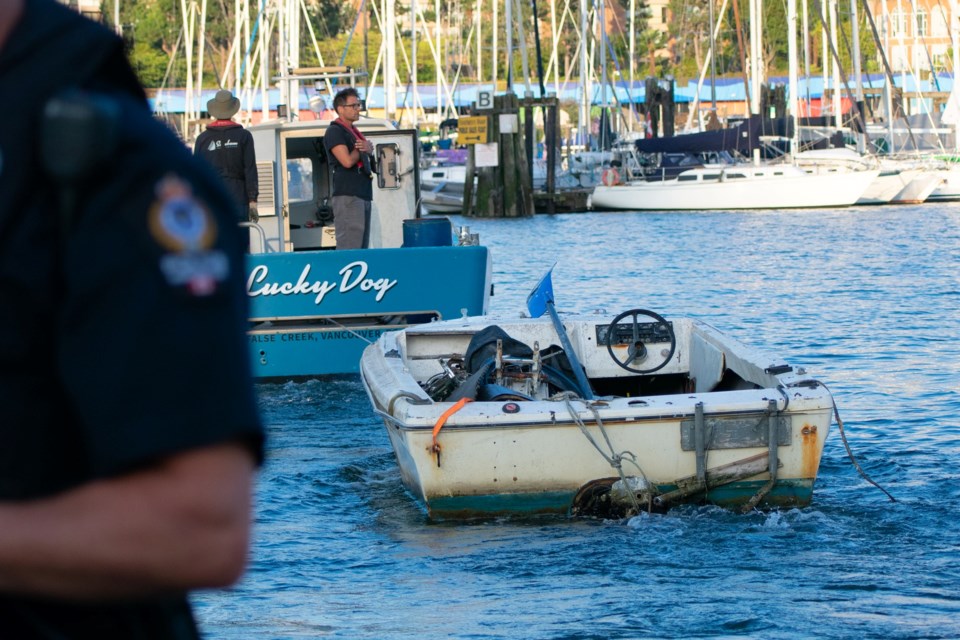There have been longstanding community concerns about derelict boats in False Creek, according to the Vancouver Police Department.
Pressure from locals regarding pollution, safety, and aesthetic issues has spurred VPD's Marine Unit along with Transport Canada and the City of Vancouver to embark on a project to clean up the harbour.
Back in September, the VPD estimated there were 100 unauthorized or dilapidated boats in False Creek. They shared via a Facebook post that jurisdiction in False Creek is shared by Transport Canada, the Canadian Coast Guard, the City of Vancouver, and the Vancouver Park Board but that VPD has the authority to enforce anchoring rules and issue direction notices to boats that are not compliant with anchoring regulations.
Boaters who have obtained a free permit through the city are entitled to anchor for 14 of 30 days in summer, and 21 of 40 days in winter but once they've used up that time they must move on, according to federal legislation known as Vessel Operation Restriction Regulations.
However, "the number of derelict and abandoned boats increased throughout the pandemic, with many dropping anchor for longer than the permitted time," VPD Sgt. Steve Addison tells Vancouver Is Awesome over email.
In April, the Vancouver Police Department’s marine unit issued approximately 100 notices to boat owners in False Creek who overstayed their allowable time, but some refused to leave.
In a renewed effort, the VPD marine unit has spent the last few weeks connecting with boaters. "We’ve asked a number of those people to leave," says Addison. "We’ve also pulled a number of abandoned boats and dinghies out of the water, freeing up the waterway for other users."
If boaters refuse to leave do they have squatters' rights?
Vancouver lawyer Kyla Lee explains that squatters' rights as they are understood in law are known as "adverse possession."
"B.C. has a law that prohibits someone acquiring title by way of adverse possession, under Section 28 of the Limitation Act. But the water is a little more complicated," she says.
Since the ocean cannot be owned or sold by anyone it would be impossible to acquire a title to any water that was part of the ocean.
"While people can get titles to marine slips and houseboats, those are not an interest in the ocean as much as an interest in the occupancy of the resources," she explains. B.C. has a "floating homes" policy that requires floating homes to be physically connected to the land by a common walkway and the provincial government is not currently issuing any more floating home community permits.
When it comes to the False Creek boats, the situation is further complicated due to the overlapping jurisdiction of municipal, provincial, and federal governments which all have various authorities over the ocean and coastal lands in different ways.
However, in general, inland waters in B.C. are under provincial jurisdiction so, legally, the stubborn boats would be an issue for the province and not necessarily the city.
So who has the right or authority to push out boaters squatting in False Creek?
"The real powers to do that come from enforcement of Federal or Provincial marine laws related to the safety and condition of the boat," says Lee. "But if they've been there a long time, and no enforcement action has been taken or any civil actions filed, there is a potential—depending on what action is taken—that the boat-dwellers could argue estoppel."
"Estoppel" is a legal defence to a civil action by saying that the opposite party permitted or allowed it through inaction, and thus is estopped from bringing a claim now.
So what does this mean for boat owners who don't want to leave?
While the VPD is kicking the boats out, the boat occupants don’t actually have to comply since their authority is neither federal nor provincial. Should they wish to argue legal standing, they could claim estoppel and their right to remain in False Creek because the feds and province have consistently not done anything to stop them.
That defence comes with some pretty large caveats though and the process would certainly make life difficult for boat occupants. They'd also need to be unafraid of being issued tickets and appearing in court (and potentially losing).
The defence relies on the boat being in pristine condition (i.e. not derelict) which is not the case for many of the long-term residents, hence the aesthetic and safety complaints cited by the VPD for their action. And even if the safety and condition of a boat in question complies with all federal and provincial guidelines, the defence would also be dependent on how long the boat has been in False Creek without intervention from Transport Canada - which does have federal authority.
Based on VPD's reports and the public's complaints, it's unlikely that many of the boats in False Creek, if any, meet all the criteria or have the resources to fight the tide.
With files from Mike Howell




